2022 Faculty Summer Reading List
Looking for a good book or two to dig into this summer? Now in its eleventh year, the Stanford Law School faculty’s Summer Reading List offers up some of our professors’ favorite reads.
Ralph Richard Banks (BA ’87, MA ’87), Jackson Eli Reynolds Professor of Law, recommends How to Change Your Mind by Michael Pollan and How the Word Is Passed by Clint Smith

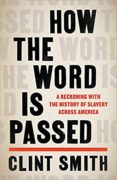
I highly recommend Clint Smith’s How the Word is Passed. This book is a prose exploration of our nation’s troubled racial history, and how it lives today in all our consciousness. The book is made even more effective by the visceral poet sensibility that suffuses the text.
Nora Freeman Engstrom, JD ’02, Ernest W. McFarland Professor of Law, recommends In Love: A Memoir of Love and Loss by Amy Bloom
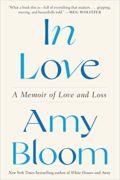
I recommend In Love: A Memoir of Love and Loss by Amy Bloom. In this luminous and heartbreaking memoir, Bloom recounts how she fulfilled her husband’s final wish: To help him to die with grace, dignity, and on his own terms. It’s a story about death—but it’s equally a story about how to live.
Lawrence Friedman, Marion Rice Kirkwood Professor of Law, recommends The Moonstone by Wilkie Collins
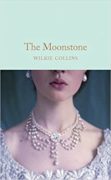
If you’d like to escape into the past, I recommend Wilkie Collins, The Moonstone, which I may have recommended before; it’s one of the first true mystery novels, and is enormously entertaining.
Robert Gordon, Professor of Law, Emeritus, recommends The Anti-Oligarchy Constitution: Reconstructing the Economic Foundations of American Democracy by Joseph Fishkin and William Forbath, New Democracy: The Creation of the Modern American State by William Novak, and The Green Man by Kingsley Amis
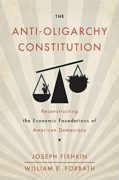
Joseph Fishkin and William Forbath, The Anti-Oligarchy Constitution: Reconstructing the Economic Foundations of American Democracy. Harvard U.P. 2022. Fishkin and Forbath, both law professors at the University of Texas, aim to revive and refresh egalitarian traditions and movements in America for use in current American politics. They have in mind anti-feudal and anti-aristocratic movements in the early Republic, Jacksonian movements against monopolies and special privileges, abolitionist agitation against the “slave power,” Reconstruction-era civil rights struggles, labor and Populist movements, the economic bills of rights of the New Deal, and the civil rights. Such traditions can inform a living Constitutionalism that is not confined to the courts, but taken up by executive and legislative branches and social movements of “the People, themselves.”
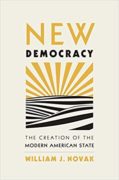
William Novak, New Democracy: The Creation of the Modern American State. Harvard U.P. 2022. In an earlier book, The People’s Welfare (1996), Novak (a historian on the University of Michigan law faculty) contributed to an extensive literature challenging the myth that America had only small and weak government before the New Deal: he found state governments vigorously exercising regulatory functions under their “police power” in the early American republic. His new book brings the story into the early 20th century, illuminating the enormous expansion of both state and federal governmental authority well before the New Deal, especially in the laws and agencies regulating public utilities and enacting Progressive social-welfare regulation and benefits.
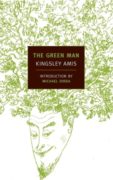
Kingsley Amis, The Green Man (1969; NY Review Press 2013). I’d guess not many people know that the author of Lucky Jim also wrote a ghost story, but he did, and this is it, and it’s amazingly good. His unlikely hero-narrator is one Maurice Allington, proprietor of a fancy country inn called the Green Man. Allington is something like Amis himself, an alcoholic womanizer preoccupied with aging and death. The ghost of a murderous 17th century cleric haunts his inn, accompanied by another Green Man, a really terrifying sort of animated tree-spirit. Amis’s skill as a writer is such that, disagreeable as Allington is in many ways, his confrontation with the ghosts reveals him as honestly self-critical and courageous.
Hank Greely, Deane F. and Kate Edelman Johnson Professor of Law, recommends JFK: Coming of Age in the American Century: 1917-1956 by Fredrik Logevall, Life as We Made It by Beth Shapiro, The Genome Defense by Jorge Contreras, and Network Effect by Martha Wells

JFK: Coming of Age in the American Century: 1917-1956
I read a lot of biographies but usually of people who I don’t remember. This was an exception. This biography is long (about 800 pages) and goes only to 1956 and the unexpected run he made for the Vice Presidential slot at the Democratic National Convention, but I found it a riveting look at family dynamics, politics, and the historical events he lived through. The author, a Harvard history professor, had the cooperation of the Kennedy family and this is not a harsh look at the young JFK, but neither is it a whitewash. I loved it and eagerly await volume II, on his last 7 years.
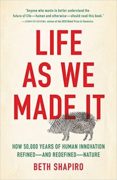
Life as We Made It
Beth Shapiro is a geneticist I know at UC Santa Cruz. This is a funny and clear look at how our species has hugely remade life on Earth in the last 50,000 years — and what more we might do in the next 50. It’s an important issue, covered enjoyably.
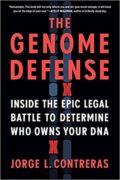
The Genome Defense
Jorge Contreras is a law professor at the University of Utah, specializing in patent law. This is an excellent popular telling of the story of The Association for Molecular Pharmacology v. Myriad Genetics, the 2013 U.S. Supreme Court decision that said DNA sequences could not be patented (sort of).
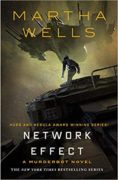
He tells the story through the people involved in a way people who are not into patent law, or biology, will follow and enjoy. And even if you, like me, do know something about those topics, you’ll enjoy it (though occasionally wish for some detail).
Network Effect
Finally, my science fiction recommendation for this list is the Murderbot Diaries by Martha Wells. I started with her 2021 Hugo and Nebula award winning novel, The Network Effect, but I should have started with the four novellas that came before it. Either way, Murderbot (a “Sec Unit”) is a captivating personality, whether or not it’s a person.
Deborah R. Hensler, Judge John W. Ford Professor of Dispute Resolution, recommends Punch Me Up to the Gods by Brian Broome and Overboard by Sara Paretsky
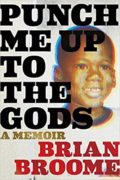
For those who appreciate memoirs, Punch Me Up to the Gods, by Brian Broome, a wrenchingly sad and at time hilarious but always provocative coming of age book by a young gay Black man, growing up in middle America. It has been shortlisted for a number of prizes. Broome spent the last six months teaching in the Bay Area and I connected with him and his followers over Facebook, where I equally appreciated his political commentary and his hilarious reactions to Bay Area life.
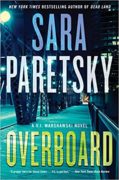
Overboard, the latest V.I. Warshawski mystery/thriller by Sara Paretsky. This is the first book I’ve read that recognizes the presence of Covid in our lives, not to mention our various political maladies. Neither are central; they are just part of the background. V.I. has become more of a social justice warrior over the series and more risk taking as well, to the point where one often has to suspend disbelief. But it was comforting to revisit her and her dogs and her elderly neighbor and old lovers. And Paretsky is a true literary craftsperson.
Erik Jensen, Lecturer in Law, recommends Liberalism and Its Discontents by Francis Fukuyama, Russia Resurrected by Kathryn Stoner, and The Gates of Europe by Serhii Plokhy
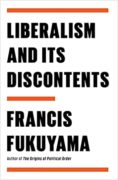
Francis Fukuyama’s Liberalism and Its Discontents reminds us that tolerance lies at the heart of classic liberalism. He traces the intellectual history that has undermined respect for the scientific method as well as for a general set of facts on which we can agree in order to govern.
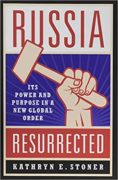
Kathryn Stoner’s Russia Resurrected published two years ago shows in detail Putin’s long-held views on Russia’s rightful place in the world. Putin’s invasion of Ukraine is completely consistent with a worldview that he has been cultivating for decades.
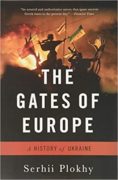
Harvard historian Serhii Plokhy’s The Gates of Europe I strongly recommend to those who are interested in a nuanced account of Ukraine’s historical struggle with Russia yet may not want to read ten books on the subject. Plokhy provides an excellent overview.
Michael W. McConnell, Richard and Frances Mallery Professor of Law, recommends The Lincoln Highway by Amor Towles
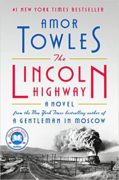
My great book discovery of the last few months is Amor Towles’ novel, The Lincoln Highway. This is the story of four boys (young men?) who journey across America on the old Lincoln Highway, along with various characters they encounter on the way. Emmett, a farm boy, was just released from a juvenile detention facility and returns to the family farm, which has just been foreclosed, to pick up his younger brother Billy (possibly my favorite character) and drive the Lincoln Highway to San Francisco on a fantastical quest to be reunited with their mother. Their plans are upended by the arrival of two of Emmett’s friends from juvie, who had escaped and followed Emmett, and proceed to “borrow” his car and drive the Lincoln Highway to New York on a fantastical quest to pick a large bequest that belongs to one of them—pursued by Emmett and Billy by train. Each chapter is told from the point of view of a different character, and each stands on its own, much like the Odyssey or Huckleberry Finn. Some of the stories almost tip into the mystical. It is a grand, funny, inspiring, thought-provoking saga. By the way, I listened to the book on Audible, and the readers (different readers for each narrator) were splendid. The book will blow you away.
Lisa Larrimore Ouellette, Professor of Law and Justin M. Roach, Jr. Faculty Scholar, recommends The Education of a Federal Judge by Judge Timothy B. Dyk, The Price of Peace: Money, Democracy, and the Life of John Maynard Keynes by Zachary Carter, and The Night Watchman by Louise Erdrich
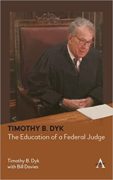
Judge Timothy Dyk’s The Education of a Federal Judge is essential reading not only for anyone interested in Judge Dyk’s fascinating legal career, but also for those who want an inside look at the modern federal judiciary and recent changes in the legal profession.
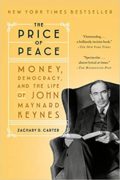
I read Zachary Carter’s The Price of Peace: Money, Democracy, and the Life of John Maynard Keynes after my colleague Bob Gordon recommended it last summer, and I heartily second his recommendation. I was initially surprised by how early in the book Carter described Keynes’s death, but I enjoyed the extensive discussion of Keynes’s legacy on U.S. economic thought as much as the earlier portions about the economist himself.
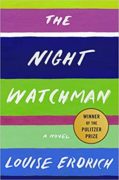
Finally, I only recently discovered what a treasure Louise Erdrich is when I read her Pulitzer-winning novel The Night Watchman, which has started me down the path of reading her extensive corpus of work.
A. Mitchell Polinsky, Josephine Scott Crocker Professor of Law and Economics, recommends Money: A Suicide Note and London Fields, both by Martin Amis
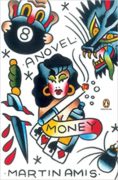
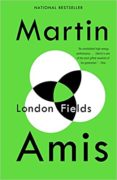
Robert Rabin, A. Calder Mackay Professor of Law, recommends Aftermath: Life in the Fallout of the Third Reich, 1945-1955 by Harald Jähner

Aftermath: Life in the Fallout of the Third Reich, 1945-1955 is an interesting account of the social, cultural, economic, and political milieu in Germany in the period immediately following World War II.
David Alan Sklansky, Stanley Morrison Professor of Law, recommends We Don’t Know Ourselves: A Personal History of Modern Ireland by Fintan O’Toole and Aftermath: Life in the Fallout of the Third Reich, 1945-1955 by Harald Jähner
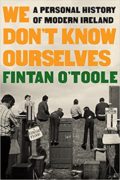
I really liked We Don’t Know Ourselves: A Personal History of Modern Ireland, by Fintan O’Toole. As the title suggests, it’s about the recent history of Ireland, using as frame the bare outlines of O’Toole’s own life, beginning with his birth in 1958. O’Toole is a terrific writer, an astute political observer, and an erudite cultural critic. Even if you’re not particularly interested in Ireland, this is an utterly fascinating story of a closed, homogeneous, theocratic society transforming itself in the course of a generation into a modern liberal state—open, cosmopolitan, and increasingly egalitarian.

I also highly recommend Aftermath: Life in the Fallout of the Third Reich, 1945-1955, which was written by Harald Jähner and translated from German by Shaun Whiteside. Like O’Toole, Jähner is a journalist, and like O’Toole he is well informed and extraordinarily perceptive. This book, too, is about a country in transition: in this case, the emergence of modern Germany from the catastrophe of the Third Reich and the wreckage of the Second World War.
Allen S. Weiner, JD ’89, Senior Lecturer in Law, recommends Humane: How the United States Abandoned Peace and Reinvented War by Samuel Moyn
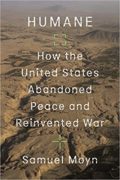
Samuel Moyn, Humane: How the United States Abandoned Peace and Reinvented War. This is an excellent history that traces, beginning in the mid-19th century, the development of international humanitarian law, or the law that governs how war is fought, and the corresponding decline of the vitality of the movement to ban war. The culmination of the trend, Moyn argues, is that in our day, the United States engages in military operations that “have become more expansive in scope and perpetual in time” (p. 9). Moyn is elusive as to whether he’s claiming that the growing commitment to humane war, particularly the protection of civilians, has in fact caused a greater willingness to wage war, but at times he hints that the answer is yes: “We made a moral choice to prioritize humane war, not a peaceful globe” (p. 7). If Moyn is pressed on the evidentiary basis for such a causal claim (as I learned when serving as the discussant for a talk he gave here at Stanford this year), he demurs, arguing that he is a legal historian, not a political scientist. If one reads Humane, bearing in mind the limitations on what Moyn is claiming, there is a great deal to admire in this rich account of the rise and deepening embrace of international humanitarian law.
